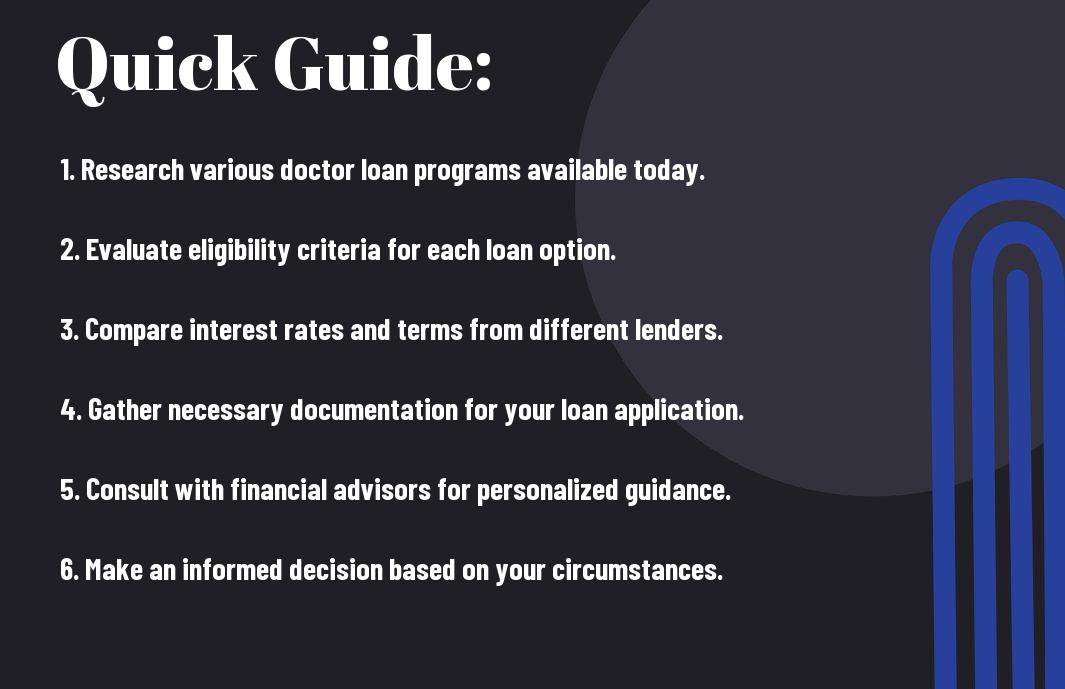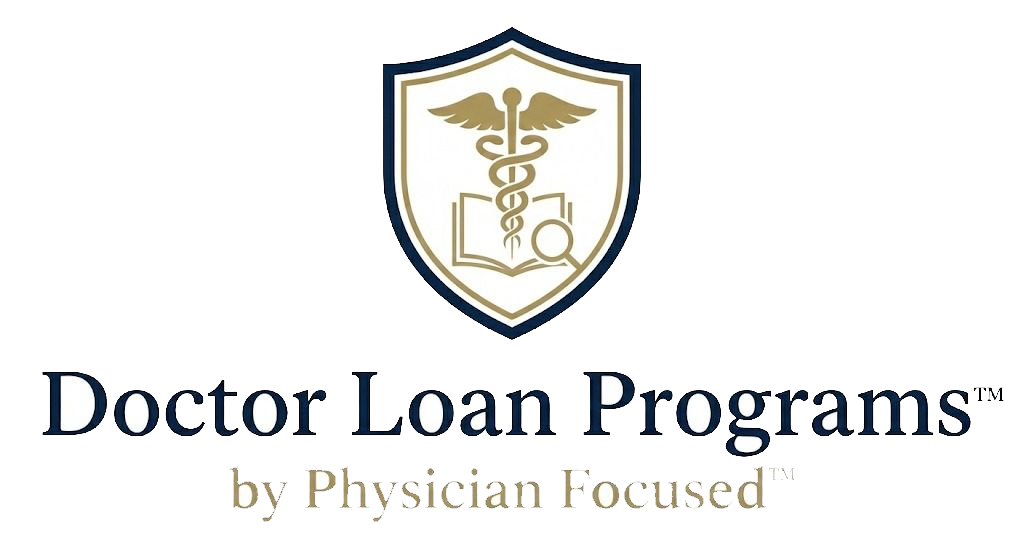Guide your financial future with insights on doctor loan programs designed specifically for physicians like you. As a medical professional, navigating the complexities of these loan options can empower you to make informed decisions about home purchasing. In this comprehensive guide, you will learn about various types of loan programs, the benefits they offer, and the eligibility requirements you need to meet. Unlock the potential of your financial resources and streamline your path to homeownership with knowledge that sets you apart in today’s competitive market.

Understanding Doctor Loan Programs
The doctor loan program is specifically designed for physicians and medical professionals, offering unique financing options to facilitate home purchases with favorable terms. Unlike traditional mortgage loans, these programs consider the unique circumstances of a physician’s career, such as their income trajectory and potential student loan debt, allowing for flexible lending tailored to your needs.
Types of Doctor Loan Programs
Any physician considering homeownership should explore the various types of doctor loan programs available. Here are some types of available options:
| Conventional Programs | Jumbo Loans |
| FHA Loans | VA Loans |
| USDA Loans | Bank-specific Programs |
- Conventional Programs: Standard loans with competitive rates.
- Jumbo Loans: Designed for high-value properties.
- FHA Loans: Government-backed loans for lower down payments.
- VA Loans: Zero-down loans for eligible veterans.
- Bank-specific Programs: Unique offerings from individual lenders.
Recognizing the diversity in loan types can help you find the best fit for your particular situation.
Key Features of Each Program
You should be aware that each type of doctor loan program comes with its own set of features, impacting your borrowing experience. Here are some key aspects:
- No Private Mortgage Insurance (PMI): Most doctor loans don’t require PMI.
- Higher Loan Amounts: Many programs offer higher limits to accommodate medical professionals.
- Flexible DTI Ratios: Debt-to-income ratios may be more lenient with these loans.
- Consideration of Future Income: Lenders often consider anticipated income during residency.
- Low Down Payment Options: Many programs offer low or zero down payment options.
This unique combination of benefits can make home buying feasible for physicians early in their careers.
Features of doctor loan programs specifically cater to the needs of medical professionals, making them an attractive choice for homebuyers in the field. Consider these additional features:
- Streamlined Underwriting: Simplified processes for quicker approval.
- Customizable Terms: Options to fit your financial strategy.
- Interest-Only Payments: Some lenders offer interest-only options for cash flow management.
- Pre-Approval Benefits: Fast-track approvals to strengthen offers.
- Diverse Repayment Options: Flexible repayment plans to accommodate various income paths.
This understanding of key features will empower you to make informed financial decisions as you pursue homeownership.
A Step-by-Step Guide to Applying for a Doctor Loan
It is important to understand the application process for a doctor loan, as this can help streamline your path to securing financing tailored for physicians. Below is a simple overview of the steps involved in submitting your application.
| Steps to Apply | Details |
| 1. Research Lenders | Find lenders that offer doctor loan programs specifically for physicians. |
| 2. Prepare Financial Documents | Gather necessary documents, such as income statements, tax returns, and letters of employment. |
| 3. Complete the Application | Fill out the loan application accurately and thoroughly. |
| 4. Submit Your Application | Send your completed application and required documents to the lender. |
| 5. Await Approval | Monitor your application status and be ready to provide additional information if requested. |
Pre-application Preparation
You should prepare by gathering vital financial documents and reviewing your credit report. Knowing your credit score can help you identify any potential issues before applying. Additionally, listing your financial goals and understanding your budget will help you select the right loan option for your needs.
Submitting Your Application
On completing your preparation, you can submit your application to the lender. This involves filling out the application form accurately and attaching the necessary documentation. Make sure all information is clear and complete to prevent delays in the review process.
The application may require details about your employment, educational background, and financial history. Double-check that all documents, such as proof of income, employment letters, and tax returns, are included. A complete and well-organized submission can significantly enhance your chances of a swift approval process.

Factors to Consider When Choosing a Loan Program
Your choice of a loan program can significantly influence your financial future. Take the time to compare the options available by assessing the following factors:
- Loan Amount and Limits
- Interest Rates and Terms
- Down Payment Requirements
- Debt-to-Income Ratio
- Loan Origin Fees
After evaluating these factors, you will be better positioned to select the most beneficial loan program tailored to your circumstances.
Loan Amount and Limits
On many occasions, the amount you can borrow is determined by your income and overall financial profile. Each lender has specific limits, which may vary widely. As a physician, ensuring that your loan amount aligns with your projected expenses—such as purchasing a home or starting a practice—is vital for achieving your long-term financial goals.
Interest Rates and Terms
Clearly, the interest rates and terms offered by various lenders can significantly impact the total cost of your loan. These rates may be fixed or variable and can influence your monthly payment amount and long-term financial obligations.
Understanding the implications of interest rates and loan terms is vital for effective budgeting. Lower interest rates can save you considerable money over time, while flexible loan terms may provide the option to adjust your payments based on your financial situation. It’s also important to consider how long you plan on staying in your residence or practice location, as this can help inform your choice of loan structure and protect against unexpected financial strain.
Pros and Cons of Doctor Loan Programs
After exploring the intricacies of doctor loan programs, you’ll want to weigh their benefits against potential disadvantages. Below is a table summarizing the pros and cons of these specialized loan offerings.
| Pros | Cons |
|---|---|
| No private mortgage insurance (PMI) required | Higher interest rates compared to conventional loans |
| Higher borrowing limits | Debt-to-income ratio may be scrutinized |
| Flexible qualification criteria | Limited to specific lenders |
| Support for new graduates | Less common in certain areas |
| Can roll student loan debt into the mortgage | May have additional fees |
Advantages for Physicians
On utilizing doctor loan programs, you can benefit from unique features that cater specifically to your profession. These programs offer higher loan amounts without the necessity for PMI, allowing you to secure your dream home despite having significant student debt. Additionally, their flexible guidelines make qualification less daunting, easing the financial burden as you transition from training to practice.
Potential Drawbacks to Consider
If you are evaluating doctor loan programs, you should be aware of potential drawbacks. While these loans have distinct advantages, they may also come with higher interest rates and additional fees. It’s important to weigh these factors against your financial situation to determine if it aligns with your long-term goals.
Doctor loan programs can be appealing, but it’s vital to approach them with caution. The higher interest rates might affect your overall mortgage costs, especially if you plan to finance a significant home purchase. Furthermore, the scrutiny on your debt-to-income ratio can be a downside, as lenders may be more cautious given your substantial student loans. Additionally, these programs are not universally available at all lenders or in every region, which might limit your options. Thoroughly research and compare different offerings to ensure the best fit for your financial landscape.
Tips for Maximizing Your Loan Benefits
Unlike traditional loan seekers, physicians have unique advantages with doctor loan programs that can maximize your benefits. To fully capitalize on these offers, consider the following:
- Understand loan terms and conditions thoroughly.
- Choose the right lender specializing in doctor loan programs.
- Work on improving your credit score before applying.
- Gather all necessary documentation ahead of time.
- Consult a financial advisor who understands your needs as a physician.
After implementing these strategies, you are more likely to secure favorable terms that align with your financial goals.
Securing the Best Rates
You should shop around and compare offers from different lenders to secure the best possible rates on your doctor loan. Factors like your credit score, debt-to-income ratio, and overall financial health will influence the rates you receive. Additionally, negotiating with lenders can yield lower rates, especially when you present a strong financial profile.
Managing Your Loan After Approval
On approval, managing your loan effectively is vital to avoid potential pitfalls. Make timely payments to maintain a good credit score and reduce the risk of default. Stay informed about any changes in interest rates, and consider refinancing if it leads to better terms. Additionally, having a financial plan helps in budgeting for future payments.
The success of managing your loan lies in proactive monitoring and strategic planning. Regularly review your financial situation and adjust your budget accordingly. Set reminders for payment dates to avoid late fees and explore options for making extra payments to reduce your principal faster. Engaging with a financial advisor periodically can also help keep your financial strategy aligned with your changing needs, ensuring you stay on track towards financial stability.
Common Mistakes to Avoid
Many physicians make mistakes during their journey to secure a doctor loan. By being aware of these common pitfalls, you can navigate the process more effectively and avoid costly errors that may arise from lack of knowledge or oversight.
Overlooking Hidden Costs
Some physicians underestimate the total costs associated with their loans by overlooking hidden fees. These can include origination fees, private mortgage insurance, and closing costs, which, if not accounted for, can significantly impact your financial planning.
Failing to Compare Options
Any physician looking for a doctor loan should diligently compare their options. Failing to do so can result in accepting terms that may not be favorable for your financial health and long-term goals.
Comparison Factors
| Term Length | Consider how long you wish to pay off your loan and if shorter or longer terms suit your financial situation better. |
| Interest Rates | Look for the lowest available rates. Even a small difference can lead to significant savings over time. |
| Fees | Check for any origination fees, closing costs, or other hidden charges that might affect the total loan amount. |
| Loan Programs | Evaluate different doctor loan programs, as some may offer specialized terms suited for your profession. |
Plus, considering all available options allows you to tailor your loan to fit your needs. Use online calculators and comparison tools to evaluate what lenders are offering. By gathering multiple quotes, you increase your chances of finding the best deal. This diligence can save you money in the long run and set a solid foundation for your financial future. Strive to be informed and make educated decisions that align with your personal and professional objectives.
Conclusion
Taking this into account, understanding doctor loan programs is crucial for you as a physician navigating your financial landscape. These specialized loans offer tailored benefits that can ease the burden of purchasing a home. By leveraging your unique status and the resources outlined in this guide, you can make informed decisions that align with your financial goals. Equip yourself with this knowledge to seize the best opportunities available, ensuring a smooth transition into homeownership while balancing your professional commitments.




